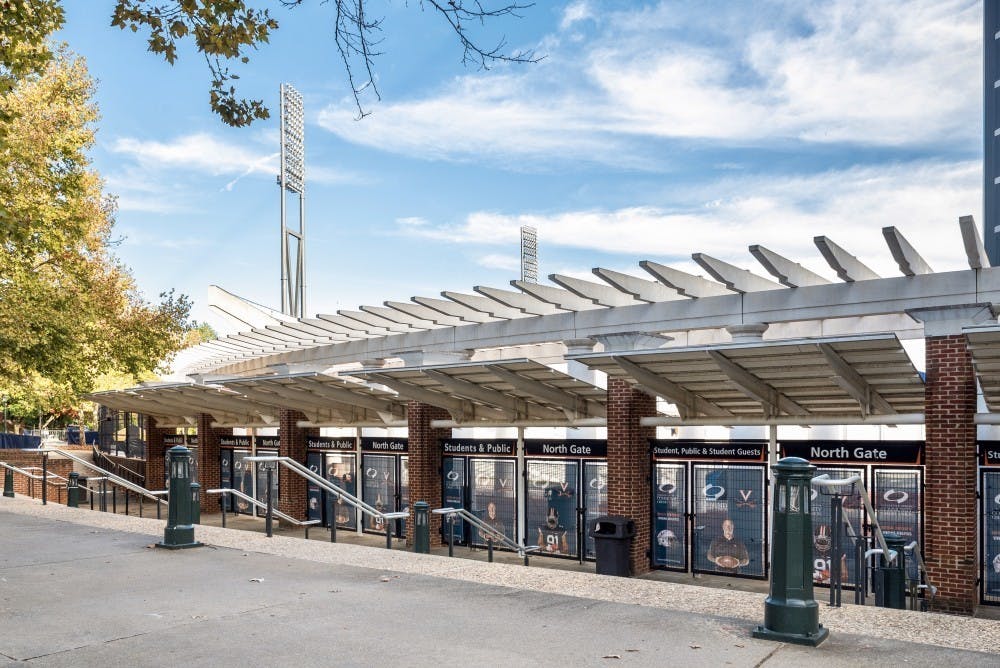Lea en español
Weekends in Charlottesville are starting to resemble a time before COVID-19 — students are taking beloved trips to Carter’s Mountain Orchard, the Corner is packed with business and Scott Stadium is filling the hill with hardly a mask in sight. The caveat, of course, is we are not back to a time without COVID-19 — the University’s case numbers and hospital admissions this semester clearly demonstrate the threat of the pandemic is not over. Even without universal testing and a near fully vaccinated student body, the University has seen 522 COVID-19 cases this semester. More alarming, though, is the University’s hospital admissions data — less than two weeks ago, we saw 16 hospital admissions related to COVID-19, a number equal to the peak we saw at the beginning of this year. Still, the University seems to be operating under the idea that COVID-19 will not spread at large gatherings in Scott Stadium.
The University’s current mask policy for football games requires unvaccinated people to wear masks at all times and everyone — regardless of vaccination status — to wear masks in indoor spaces in the stadium. The University even urged students to wear masks outdoors while watching the game. However, there was little to no enforcement. Over 36,000 people packed into Scott Stadium for each of the past two home games, meaning these games have the potential to become superspreader events and wreak havoc on the Charlottesville and University communities. For this reason, we are urging University administration to require proof of vaccination status or a negative COVID-19 test for entry into future games — from both students and community members — and to continue to urge universal masking at all times in all areas of Scott Stadium.
Late last month, Oregon and Oregon State became the first Power Five Schools to require proof of vaccination status or a negative COVID-19 test for those over the age of 12 to enter football games. According to the policies, the negative test result must be from within three days of the game to be accepted. However, these schools are not alone. Louisiana State University President William Tate said in a statement that LSU will require proof of vaccination status or a negative COVID-19 test within the past 72 hours. “As the flagship institution of the state of Louisiana, our foremost responsibility is to ensure the safety of our students, our supporters, and our community," Tate said. This monumental decision made LSU the first SEC school to mandate COVID-19 precautions for football games, and also let them lead by example in a region with relatively low vaccination rates. The University should learn a lesson from these programs and prioritize safety. We have an opportunity and responsibility to promote COVID-19 awareness. This can start in Scott Stadium.
Further, University administration cannot require students to attend in-person classes wearing masks if they are not willing to enforce the same mandates at football games. It is hypocritical and naive to think COVID-19 can spread in a class of 15 students but not in a stadium packed with tens of thousands of people from across the country. While we acknowledge an outdoor environment such as Scott Stadium has better air ventilation than a University classroom, the capacity of the stadium coupled with the proximity of guests to one another makes the event potentially dangerous. Not to mention, the majority of season ticket holders are over 50 years of age, making them more likely to become seriously ill, especially with the rising concern of the Delta variant. Thus, the University should encourage universal masking on top of requiring either proof of vaccination status or a recent negative COVID-19 test to enter the stadium. The University also needs to better enforce its masking requirement for unvaccinated guests, which includes clarifying the lines between indoor and outdoor spaces in the stadium.
Schools such as Liberty University temporarily transitioned to online instruction for a two-week period as an attempt to curb increasing positive cases. This came after their lack of vaccine requirements and mask mandates. Since returning to a hybrid in-person learning environment, they now encourage — but do not require — masks on campus, with no mention of a vaccine mandate. This should serve as a lesson to the University to take masking requirements, vaccine status and COVID-19 testing seriously, especially for major events such as football games.
Allowing guests to come into the stadium without taking any precautions to ensure the safety of those around them is reckless and irresponsible. The University needs to do its part in protecting members of both the University and Charlottesville communities by requiring proof of vaccination status or a negative COVID test within the past 72 hours in order to enter Scott Stadium. This will not only ensure the longevity of the season and a continuance of in-person instruction, but it will also increase safety measures in the stadium so that fans can focus on enjoying the game they came to watch. The University has an opportunity to guide others through its behavior instead of its words.
The Cavalier Daily Editorial Board is composed of the Executive Editor, the Editor-in-Chief, the two Opinion Editors, their Senior Associate and an Opinion Columnist. The board can be reached at eb@cavalierdaily.com.







